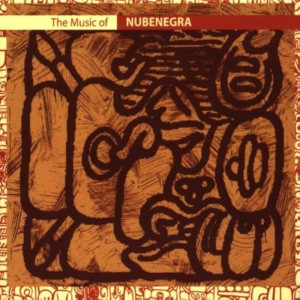 Brendan Foreman wrote this review.
Brendan Foreman wrote this review.
In 1994 Manuel Dominguez, a longtime devotee to traditional Spanish music, began the Nubenegra label out of Madrid, Spain. Originally dedicating his label solely to Spanish and Cuban music, he soon expanded its coverage to musical styles from Brazil to Sudan and most of the land-masses in between. The result is a record label — in collaboration with Intuition Records since 1996 — that is doing a remarkable job of gathering and recording a vastly talented, intercontinental artists whose styles of music may vary hugely — from Afro-cuban pop to Gypsy jazz to traditional Sudanese music — but who all have excellent musicianship in common.
The sampler CD The Music of Nubenegra showcases the achievements of these remarkable artists. There are a total of twenty tracks from almost as many releases. Individually, each of these songs seem to illustrate a particular tradition. Yet, taken together, there seems to be a common thread of Mediterannean — and especially Spanish — culture and its influence on the Americas.
Several of artists on this CD practice a particular style of traditional music. Luis Delgado reaches way back in history to recreate the hypnotic, percussive sounds of twelfth-century Moorish Spain for his settings of the poems of Ibn Al-Zaqqaq, whereas I Gitanos continue the more recent tradition of Gypsy and Latino jazz which was practiced by the legendary guitarist Django Reinhardt. Other traditional styles that show up are the fast-paced rumba as played by the Cuban group Vieja Trova Santiaguera as well as the serenade form called the habanera as sung by the Castilian singer Maria Saldago.
There are also a number of artists who don’t necessarily stick to one tradition but use as many as are at their disposal. The Guinea Bassau artist Bidinte creates a haunting, stark Caribbean sound. La Sal De La Vita consists of three female singers — Uxia from Galicia, Maria Saldago from Cuba, and Rasha from Sudan — each of whom are famous for their own particular traditional styles. Here they combine their talents to create a pleasing cross-continental pop style. Also, of note among these “hybrid” artists is Mestisay. Hailing from Spain’s Canary Islands, they create a music that draws influence from Africa to Great Britain. On this CD, they perform a bewitching, accordion and mandolin song called “Canciones del Sur.”
Although it’s very hard to pinpoint such things among so many excellent tracks, the highlight of this CD is a selection of three songs from Dominguez’ most ambitious Nubenegra release to date, a three-CD package called Sahrauis documenting the musical culture of the Saharan people known by that name. These CDs were recorded by researchers living in the refugee camps in which the Moroccan government has forced the Sahrauis to live for the past two decades.
The delicate chant-and-drum of “Dios Mio” performed by the young Aziza Brahim; the slightly mournful yet optimistic mix of synthesizer and traditional instrumentation of Hafed Mayub’s “Madre, no llores por mi” (Mother, don’t cry for me); and finally the bluesy arabic of Martir Luali’s “Jamaz”; all give evidence of a thriving musical scene that tastefully draws elements from both Sahrauian tradition as well as the modern world.
Ending with a moving song by celebrated Portuguese chanteuse Uxia, this CD is a great introduction to a wide variety of World music: four continents worth of material, no less. It provides the listener with a sneak peek at some up-and-comers in the fields as well as a glimpse of the recognized masters in a well-produced, accessible format.
(Intuition Records, 1998)
